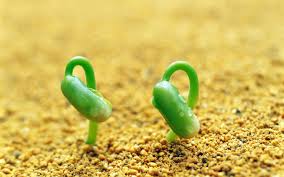记忆方法
burgeon:暴长。迅速的生长——迅速成长,发展。
2. 谐音“播进”----春天把种子播进土里,等待发芽。
2. 谐音“播进”----春天把种子播进土里,等待发芽。
中文词源
burgeon 激增
bur, 蓓蕾,繁殖,来自bear, 生育。
英语词源
- burgeon (v.)
- early 14c., "grow, sprout, blossom," from Anglo-French burjuner, Old French borjoner "to bud, sprout," from borjon "a bud, shoot, pimple" (Modern French bourgeon), of uncertain origin. Perhaps from Vulgar Latin *burrionem (nominative *burrio), from Late Latin burra "flock of wool," itself of uncertain origin. Some sources (Kitchin, Gamillscheg) say either the French word or the Vulgar Latin one is from Germanic. The English verb is perhaps instead a native development from burjoin (n.) "a bud" (c. 1300), from Old French. Related: Burgeoned; burgeoning.
权威例句
- 1. My confidence began to burgeon later in life.
- 我年纪大些之后,信心才开始增强。
- 2. Plants burgeon from every available space.
- 只要有一点空隙,植物就会生根发芽。
- 3. In the spring, the plants that burgeon are a promise of beauty that is to come.
- 春天, 草木发出嫩芽,这意味着万物吐艳就在眼前.
- 4. We hope that the festival will burgeon out slowly but steadily.
- 我们希望这欢乐的日子将逐步稳定的发展下去.
- 5. Seeds begin to burgeon at the commencement of spring.
- 春天开始时种子开始发芽.

